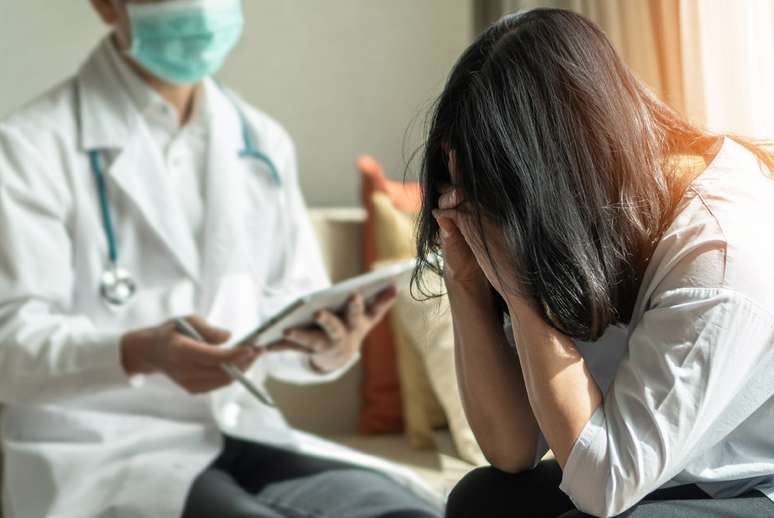Lack of control over eating and shame are common and serious characteristics faced by those suffering from the disorder “I ate non-stop, I had no control, I just wanted to eat more and more, and it didn’t matter what.” This is how Fernanda, 26, describes the bouts of binge eating disorder she has faced […]
Lack of control over eating and shame are common and serious characteristics that afflict those who suffer from the disorder.
“I was eating nonstop, I had no control, I just wanted to eat more and more and it didn’t matter what.” This is how Fernanda, 26, describes the attacks of Binge Eating Disorder that she had to deal with for eight years, until she really understood that she was sick.
He says he doesn’t remember exactly when it all started, but that he had to ask for help when he felt he had no reason to live anymore. “I found myself trapped, unable to leave the house, drowned in tears, isolated even from my own family. My emotions were out of control and the feeling of helplessness and shame in the front of my mind convinced me that nothing else had meaning, that there was no light at the end of the tunnel, that from then on my existence would always be like this.”
Lots of food in a short time
Among eating disorders, compulsion is most common today. Characterized by the ingestion of a large amount of food in a short period of time, up to two hours, with a feeling of lack of control.
According to Cirilo Tissot, Master in psychiatry of the IPq-USP and director of the Audeamus Clinic, the crisis often appears during episodes of anxiety and emotional emptiness, in which food is linked to the search to mask these symptoms. “It’s a process that happens very quickly. The person eats until they feel full and also feels pain during this process. They generally eat without feeling hungry, because they’re trying to get relief.”
“The person with the compulsion usually eats secretly, because this act in itself is shameful for them. All this makes them feel more and more depressed and guilty during this process.”
The most common symptoms of uncontrolled eating
Again according to the psychiatrist, the main indicators of binge eating within the disorder are five:
- Eat quickly;
- Continue eating, despite the feeling of suffocation (being stuffed);
- Eating even without feeling hungry;
- Eating in secret;
- Feeling depressed or guilty after eating.
Embarrassment is an aggravating factor of binge eating
Fernanda’s testimony is strong, but it is the daily reality of those who live with Binge Eating Disorder. Shame is one of the deepest and most delicate feelings in this problem, as it leads to total isolation and makes it difficult for the person to ask for help. As a result, it prevents her from healing. “At the beginning this comes from a lack of control, so the person feels guilty, gets depressed, creates insecurity about it,” Tissot points out.
But the doctor also underlines that a second is cultural, the result of society itself. “Thinness is for many a symbol of beauty, of social acceptance. Every person who is overweight perceives himself as an outcast from this social environment. A person stressed by binge eating and who is obese realizes this when he buys clothes, on chairs public transport, movement restrictions… This makes them no longer want to go out and isolates themselves.”
“Fatphobia makes people feel excluded and have default thoughts about what they can and cannot do. With this exclusion, they are unable to follow many of the activities that other people do.”
It can appear mainly indoors
Although binge eating disorder is widely associated with obesity, there is another, much more important factor that occurs within this condition: familial aggregation. It is understood that this is linked to a learning and reward system, where family closeness at events, lunches and dinners is overvalued.
“Eating in abundance as synonymous with happiness and joy makes the person learn to follow this rhythm, creates this habit”, underlines the psychiatrist.
Psychologist, clinical therapist and speaker Luana Couto reiterates that this scenario can be seen as a predisposition to compulsion. “It is common to hear accounts of family and cultural habits such as: having to repeat the dish to ‘show that you liked the food’, eating everything to ‘not waste’, offering gifts in exchange for eating ‘an extra spoonful’, threats of punishment for scraping the plate, etc. Such practices act as “rituals,” obligations, and cause the person to stop noticing and obeying the physiological responses of the satiety center in the brain,” he explains.
…and vice versa
And the opposite scenario is also true. “The cult of thinness associates losing weight with restrictive diets, in which the person skips meals or tries to eat low-calorie foods, with less nutritional value, as a way to not gain weight, which is a mistake,” says Cirilo . Tissot.
“Social contact in the context of valuing abundant eating, or even the idea that restrictive diets can be beneficial to the body, raises the problem of binge eating in people who, theoretically, don’t have the genetics for it.” – Cirilo Tissot, Master in Psychiatry of the IPq-USP.
Compulsion x bulimia x anorexia
The most common eating disorders are anorexia nervosa, bulimia nervosa and binge eating. According to Tissot, binge eating disorder differs from bulimia and anorexia nervosa in that the former does not generate body dysmorphia. “Even if there is the worry of gaining weight, she is able to have a more realistic view of her body than with bulimia or anorexia nervosa,” she explains. “In anorexia nervosa the person sees himself as very fat even if he is underweight. In the case of bulimia binges occur, there are compensatory aspects, so the person tries to vomit, because there is an excessive worry about losing weight.”
Thinness is not a sign of health
The psychologist Luana also highlights that some factors can “compensate” for binges, given the absence of indicators that signal deviations, such as people who are not overweight and who have exams “under control”, and also those who accept of being overweight without being overweight. in health control. “While a person may love the way they see themselves in the mirror, it is important to be aware of the silent signs that are life-threatening, such as waist circumference, fat in certain organs, etc.”
I recognized that I needed help. Is there a way to treat binge eating?
Yes, the cure exists and, although it is a delicate process, it is not necessary to wait for pain or something more serious to seek help and a solution, as Luana explains. “What is recommended is a multidisciplinary action, involving doctors to investigate issues relating to the functioning of the body, nutritionist and psychotherapy to evaluate issues involving behavioral and emotional patterns.”
CBT – cognitive behavioral therapy – is highly recommended in most cases. “The approach can support in a more pragmatic way the search for the patient’s specific causes that led him to such a compulsive scenario, as well as the particularities of how he copes with the situation, helping him to create a new functional and healthy repertoire,” he justifies.
“Under no circumstances is it advisable to act with restrictions, be they dietary or linked to changing behavioral patterns.”
Weight loss medicine… can I take it?
The therapeutic strategy can also count on pharmacological support, as Luana explains. “Precisely to accommodate the changes, avoid a rebound and the compulsion to return with greater force. But this intervention must be carried out by qualified and specialized professionals.”
Psychiatrist Cirilo Tissot reaffirms the importance of pharmacological treatment, which can transform the patient’s life, but issues a warning. “The problem is when people start generalizing medications without understanding the differences that exist between them and when, in fact, they should be used.”
Source: Terra
Ben Stock is a lifestyle journalist and author at Gossipify. He writes about topics such as health, wellness, travel, food and home decor. He provides practical advice and inspiration to improve well-being, keeps readers up to date with latest lifestyle news and trends, known for his engaging writing style, in-depth analysis and unique perspectives.









